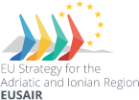Biodiversity Protection Scenario for the Adriatic and Ionian Seas by 2030 – Press Release
Brussels, March 14, 2024: The Municipality of Izola organised an event in Brussels titled “Biodiversity and Marine Protection in the EUSAIR: A Contribution to the EU Biodiversity Strategy 2030” in association with the Ministry of Natural Resources and Spatial Planning within the framework of the EUSAIR Support Points project, co-financed by the Interreg IPA ADRION Programme. The event was attended by over 50 participants from various countries and sectors who listened to presentations from the European Commission, Montenegro, Croatia, Bosnia and Herzegovina, Tunisia, Spain, and Slovenia.
The focus of the event, realised by the Slovenian Business and Research Association in Brussels as the local partner, was the presentation of one of the possible scenarios for protecting the Adriatic and Ionian seas in line with the EU Biodiversity Strategy for 2030. The event took place within the framework of the COP23 Portorož, where Slovenia assumed the presidency of the Barcelona Convention on December 4, 2023. In Istria, we hosted 21 high representatives from Mediterranean countries who were signatories to the Barcelona Convention then.
The Thematic Steering Group for Environmental Quality of the European Strategy for the Adriatic-Ionian Region (EUSAIR) once again proved to be an excellent platform for cooperation and discussion of environmental issues with the European Commission. The event was aligned with the EU Biodiversity Strategy for 2030, which aims to protect 30% of seas and strictly protect 10% by the designated year. This means that marine organisms within these 10% areas cannot be exploited to preserve the common ecosystems. The event was also in line with the United Nations Environmental Programme/Mediterranean Action Plan (UNEP/MAP) environmental program, which aims to promote a sustainable future for ecosystems. The meeting included presentations from leading experts and the European Commission, making it productive and insightful.
David Brozina, Ambassador, Deputy Permanent Representative to the EU, and Representative to, welcomed the guests and highlighted, "The Habitat Restoration Act represents a significant direction for achieving biodiversity goals by 2030, not only at sea but also on land. Nature has no guardian, so cooperation within EUSAIR is crucial".
His speech was followed by Dr Mitja Bricelj, the coordinator of Thematic Pillar 3 - Environmental Quality within the framework of the EUSAIR strategy, and from the Ministry of Natural Resources and Spatial Planning of the Republic of Slovenia, who presented the contribution of the Portorož Declaration from the COP23 conference and the EUSAIR Strategy to the EU Biodiversity Strategy for 2030.
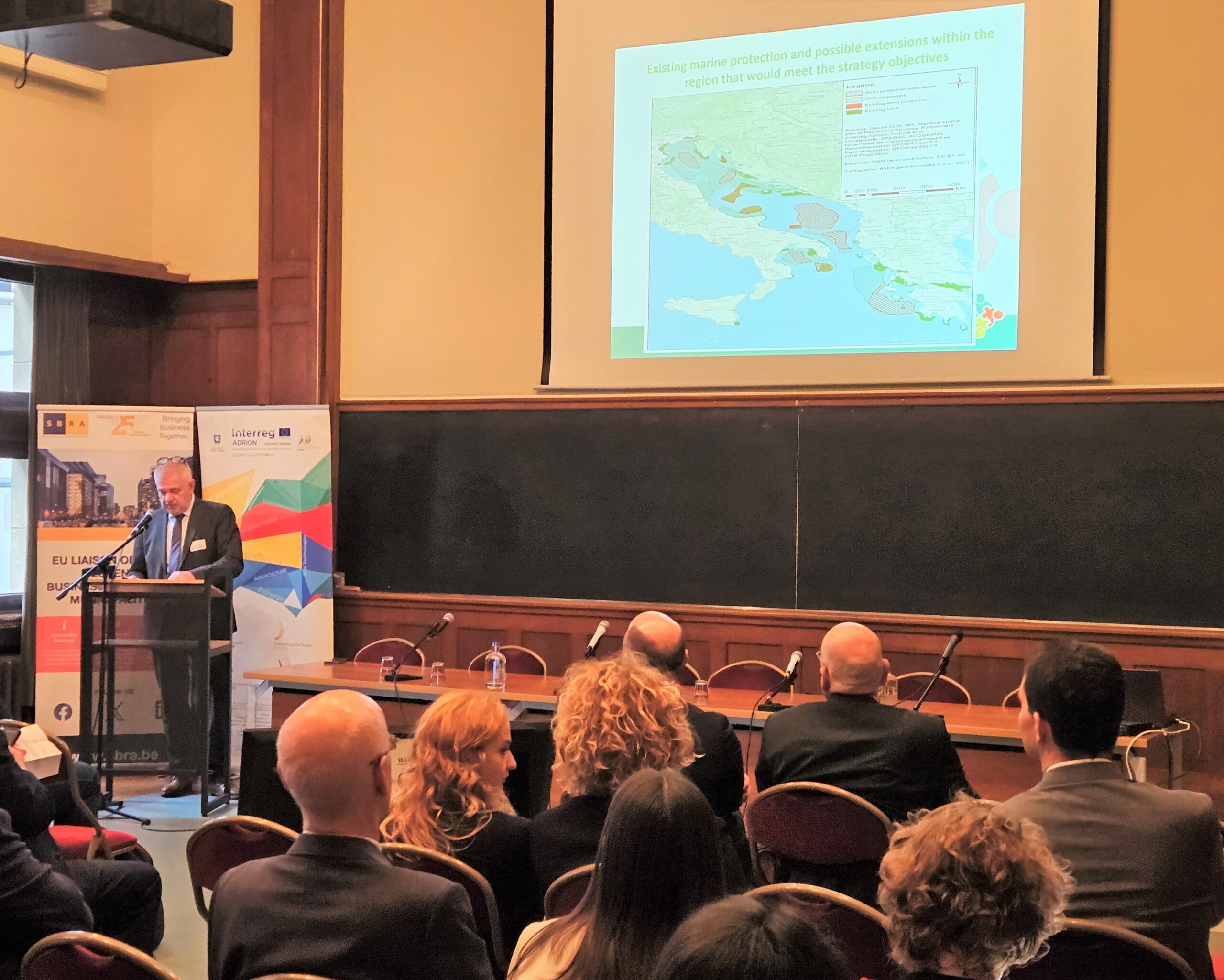
He emphasised: "The attempt to establish transboundary marine protected areas in the Adriatic and Ionian Seas aims to achieve the goals of the EU Biodiversity Strategy for 2030, which envisions protecting 30% of the EU's seas by 2030, with at least one-third of protected areas being strictly protected, amounting to 10% of the EU's seas. In Slovenia, within the framework of the presidency of the Barcelona Convention, we have prepared a proposal for all EUSAIR countries, which is the result of Slovenian expertise. We believe the quality pillar platform in EUSAIR is suitable for such discussions. These discussions help countries consider transboundary protected areas beyond territorial waters, as ecosystems do not recognise boundaries".
This was followed by Dr Mitja Grbec, Vice-President of the Maritime Law Association of Slovenia, who presented a proposal in collaboration with Mr Marko Starman, an external expert of TSG 3. The proposal included scenarios for creating a network of protected marine areas in line with the EU Biodiversity Strategy for 2030. This proposal aims to encourage countries to work together to harmonise transboundary ecosystem services and help preserve biodiversity within the EUSAIR region.
Following Dr Grbec's speech, Mr Humberto Delgado Rosa, Director for Biodiversity at the Directorate-General (DG) for the Environment of the European Commission, placed the protection and restoration of marine biodiversity in the context of the EU Biodiversity Strategy for 2030 and of the Kunming-Montreal Global Biodiversity Framework: "Marine protected areas deliver an important part of the ecosystem services that are crucial for human life, health and development. They are also important for fishers and the blue economy, as it is well proven that the spillover effect around no take zones and strictly protected areas increase fishing opportunities. A good example of this can be found in the Adriatic around the Jabuka/Pomo pit, where especially the new generations of fishers are aware of the benefits of the protected area for their activity".
Countries aspiring to join the European Union were represented by experts who presented the Coastal Zone Management Program (CAMP) to the audience. Mr Senad Oprašić, in the role of the EUSAIR co-coordinator of Pillar 3 Thematic steering group, presented the Bosnia and Herzegovina Coastal Zone Management Program via video, while Mrs Tamara Brajović and Mrs Djurdjina Bulatović from the Ministry of Ecology, Space and Urbanism of Montenegro presented the Program for the Management of the Coastal Zone of Montenegro, highlighting: "Montenegro's transfer of the European legal order in the field of nature conservation and biodiversity is increasingly consistent with the EU Biodiversity Strategy until 2030, despite the fact that Montenegro is not yet a member state." They presented three new marine protected areas that Montenegro established in the last three years. "When establishing these protected areas, we saw the importance of blue and green corridors, as the need and sense of cross-border protection immediately became apparent".
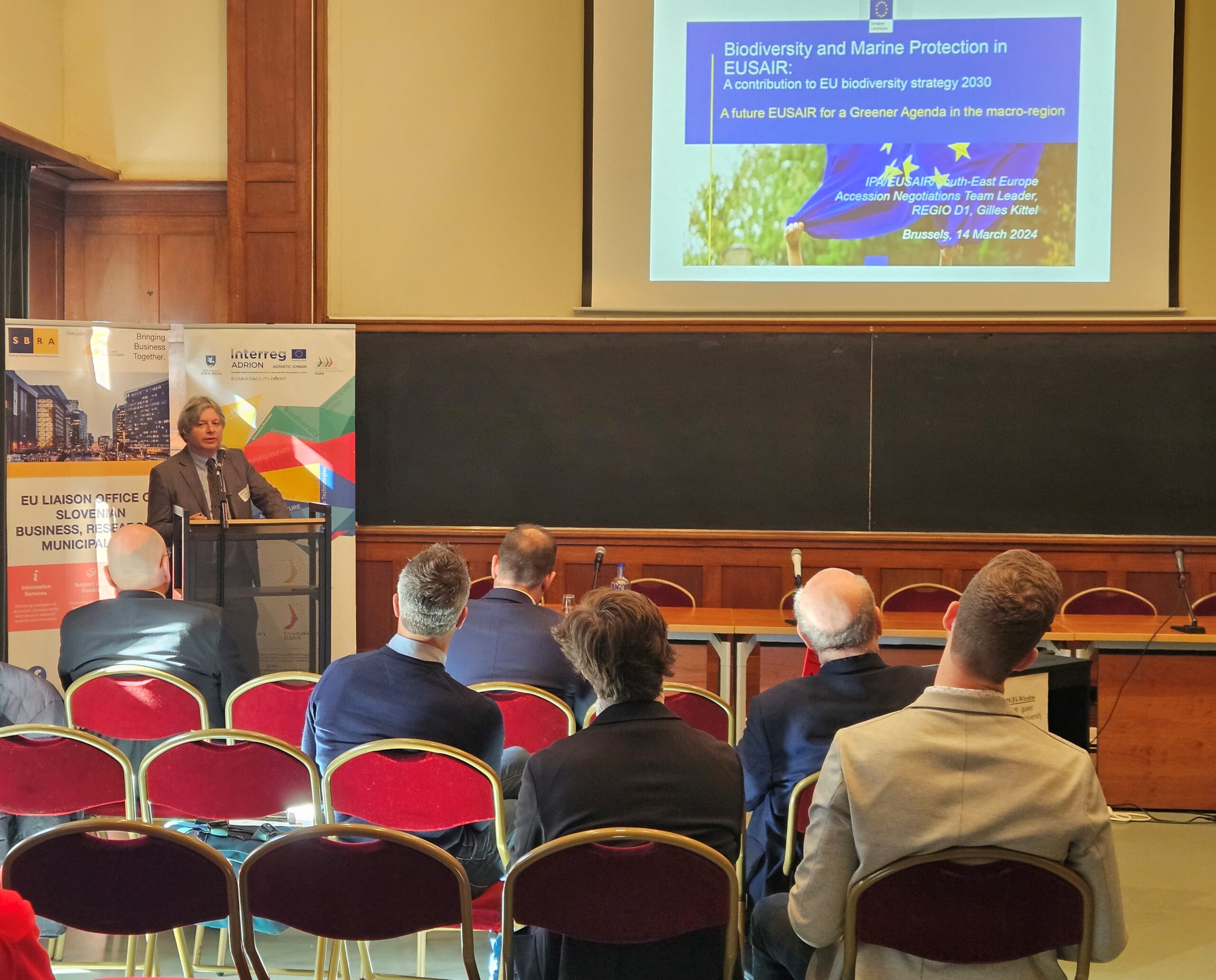
This was followed by Dr Peter Mackelworth from The Marine Institute, Croatia, who gave a video presentation titled "Integrating Marine Conservation into Regional Maritime Spatial Planning Frameworks to Achieve Global and EU 2030 Goals". He focused on ecologically or biologically critical marine areas outlining the importance of developing systematic conservation planning in the broader transboundary marine spatial planning. Following Dr Mackelworth's presentation, Mrs Maria Garcies i Ramon, Acting Executive Secretary of the Conference of Peripheral Coastal Regions (CPMR) Interemditerranean Commission, gave a presentation on the role of regional authorities in biodiversity conservation. After the presentations, an expert debate took place, which allowed for the development of conclusions that will pave the way for future measures and cooperation in biodiversity conservation. Finally, we were honoured by the presence of Mr Gilles Kittel from the European Union's Directorate-General for Regional Policy and Cities, who emphasised the importance of macro-regions in the European Union. He showed data that highlighted the success rate of Slovenia and Croatia in preserving biodiversity.
Following the decisions adopted at Barcelona Convention COP 23 Portorož Ministerial declaration, the conference ‘Biodiversity and Marine Protection in EUSAIR: A contribution to EU Biodiversity Strategy 2030’, was organised in Brussels. Considering the report of the European Environment Agency, the Adriatic-Ionian Region (AIR) is a hotshot for biodiversity yet also one of the most endangered in the Mediterranean.
At the event, the following conclusions were adopted:
- Commitments should be made at macro-regional and national level to ensure that by 2030, at least 30% of the AIR coastal and marine areas are effectively preserved and managed, thus aligning the region with the EU Biodiversity Strategy, the Barcelona Convention Post-2020 SAPBIO and the Kunming-Montreal Global Biodiversity Framework.
- Based on the legal analysis and scenario it could be possible to expand marine protected areas by 24% (from 10% to 34%) by 2030. In addition, strictly protected areas would be increased from 0.5% to over 12%. Such an expansion should be rooted in existing legal frameworks and initiatives, with a particular emphasis on regions beyond 12 Nautical Miles (NM).
- Efforts should be intensified to implement national and transboundary Maritime Spatial Planning and Integrated Coastal Zone Management to provide a framework to balance systematic conservation with the development of sustainable and resilient blue economy.
- National pledges should be made to stop the degradation and encourage the restoration of marine and coastal areas through the implementation of regional frameworks and agreements, particularly the EU Biodiversity Strategy and the Barcelona Convention Post-2020 - The Strategic Action Programme for the Conservation of Biological Diversity - SAPBIO.
- States should be encouraged to ratify and implement The International Convention for the Prevention of Pollution from Ships (MARPOL) Annex VI whilst promoting the importance of the designation of a Particularly Sensitive Sea Areas in the Adriatic-Ionian Region.
- Transboundary cooperation is required at regional level to operationalise the EU Biodiversity Strategy, the Barcelona Convention Post-2020 SAPBIO, and other relevant policies to harmonise national plans and strategies. Further strengthening and expansion of the Quadrilateral Commission for the Protection of the Adriatic Sea should provide an appropriate mechanism through which to promote cooperation.
- Further emphasis should be placed on the coordination and digitisation of data for wide-ranging sentinel species to identify areas of connectivity for blue corridors and as indicators of regional health. As part of this, augmented citizen science programmes will further promote the shared value and recognition of the unity of the rich natural heritage of the region.
- Regional institutions should provide sufficient support to the non-EU countries to reach the regional targets outlined by the EU Biodiversity Strategy, the Barcelona Convention Post-2020 SAPBIO. This would enable further dialogue with The Mediterranean Action Plan of the United Nations Environment Programme (UNEP/MAP) and access to capacity building and other support from the regional activity centres.
The event was organised within the scope of the project "EUSAIR Facility Point — Supporting the EUSAIR Governance for Improved Cooperation," co-financed by the Interreg IPA ADRION Programme (2021-2027).
Contact for more information:
Darja Dobrila,
Public agency for the promotion of entrepreneurship and developing projects of Municipality of Izola
Sončno nabrežje- Riva del sole 4,
6310 Izola-Isola, Slovenia.
e: jzp@izola.si,
t:+386 5 66 00 263
You might be interested in
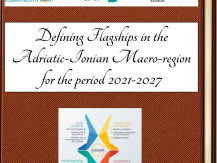
EUSAIR flagships all summed up!
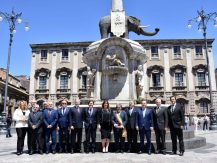
3rd EUSAIR Annual Forum – CATANIA DECLARATION

The Hellenic Republic assumes the Presidency of the EU Strategy for the Adriatic and Ionian Region (EUSAIR) (1 June 2024 – 31 May 2025)




